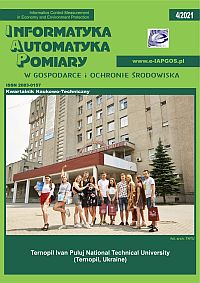APPLICATION OF THE THREAT INTELLIGENCE PLATFORM TO INCREASE THE SECURITY OF GOVERNMENT INFORMATION RESOURCES
Article Sidebar
Issue Vol. 11 No. 4 (2021)
-
SINGULAR INTEGRATION IN BOUNDARY ELEMENT METHOD FOR HELMHOLTZ EQUATION FORMULATED IN FREQUENCY DOMAIN
Tomasz Rymarczyk, Jan Sikora4-8
-
APPLICATION OF THE THREAT INTELLIGENCE PLATFORM TO INCREASE THE SECURITY OF GOVERNMENT INFORMATION RESOURCES
Bohdan Nikolaienko, Serhii Vasylenko9-13
-
INDIRECT INFORMATION HIDING TECHNOLOGY ON A MULTIADIC BASIS
Volodymyr Barannik, Natalia Barannik, Oleksandr Slobodyanyuk14-17
-
SELECTED APPLICATIONS OF DEEP NEURAL NETWORKS IN SKIN LESION DIAGNOSTIC
Magdalena Michalska18-21
-
EFFICIENT LINE DETECTION METHOD BASED ON 2D CONVOLUTION FILTER
Paweł Kowalski, Piotr Tojza22-27
-
FACTOR ANALYSIS METHOD APPLICATION FOR CONSTRUCTING OBJECTIVE FUNCTIONS OF OPTIMIZATION IN MULTIMODAL TRANSPORT PROBLEMS
Serhii Zabolotnii, Artem Honcharov, Sergii Mogilei28-31
-
QUALITY OF SATELLITE COMMUNICATION IN SELECTED MOBILE ANDROID SMARTPHONES
Przemysław Falkowski-Gilski32-37
-
CHROMATIC DISPERSION COMPENSATION IN EXISTING FIBER OPTIC TELECOMMUNICATION LINES WITH THE GROWING BIT RATES NEEDS OF DWDM SYSTEM
Tomasz Bobruk38-41
-
FIBRE OPTIC BRAGG STRUCTURES WITH MONOTONIC APODISATION CHARACTERISTICS
Jacek Klimek42-46
-
ON THE CAPACITY OF SOLAR CELLS UNDER PARTIAL SHADING CONDITIONS
Mateusz Bartczak47-50
-
CONTROLLING A FOUR-WIRE THREE-LEVEL AC/DC CONVERTER WITH INDEPENDENT POWER CONTROL IN EVERY PHASE
Bartłomiej Stefańczak51-54
-
METHOD OF MEASUREMENT AND REDUCTION OF THE ELECTROMAGNETIC DISTURBANCES INDUCTED BY SWITCHING SURGES IN LV CIRCUITS
Patryk Wąsik55-61
-
INCREASING THE COST-EFFECTIVENESS OF IN VITRO RESEARCH THROUGH THE USE OF TITANIUM IN THE DEVICE FOR MEASURING THE ELECTRICAL PARAMETERS OF CELLS
Dawid Zarzeczny62-66
-
ELLIPSOMETRY BASED SPECTROSCOPIC COMPLEX FOR RAPID ASSESSMENT OF THE Bi2Te3-xSex THIN FILMS COMPOSITION
Vladimir Kovalev, Saygid Uvaysov, Marcin Bogucki67-74
-
APPLICATION OF LOW-COST PARTICULATE MATTER SENSORS FOR MEASUREMENT OF POLLUTANTS GENERATED DURING 3D PRINTING
Jarosław Tatarczak75-77
Archives
-
Vol. 13 No. 4
2023-12-20 24
-
Vol. 13 No. 3
2023-09-30 25
-
Vol. 13 No. 2
2023-06-30 14
-
Vol. 13 No. 1
2023-03-31 12
-
Vol. 12 No. 4
2022-12-30 16
-
Vol. 12 No. 3
2022-09-30 15
-
Vol. 12 No. 2
2022-06-30 16
-
Vol. 12 No. 1
2022-03-31 9
-
Vol. 11 No. 4
2021-12-20 15
-
Vol. 11 No. 3
2021-09-30 10
-
Vol. 11 No. 2
2021-06-30 11
-
Vol. 11 No. 1
2021-03-31 14
-
Vol. 10 No. 4
2020-12-20 16
-
Vol. 10 No. 3
2020-09-30 22
-
Vol. 10 No. 2
2020-06-30 16
-
Vol. 10 No. 1
2020-03-30 19
-
Vol. 9 No. 4
2019-12-16 20
-
Vol. 9 No. 3
2019-09-26 20
-
Vol. 9 No. 2
2019-06-21 16
-
Vol. 9 No. 1
2019-03-03 13
Main Article Content
DOI
Authors
Abstract
With the development of information technology, the need to solve the problem of information security has increased, as it has become the most important strategic resource. At the same time, the vulnerability of the modern information society to unreliable information, untimely receipt of information, industrial espionage, computer crime, etc. is increasing. In this case, the speed of threat detection, in the context of obtaining systemic information about attackers and possible techniques and tools for cyberattacks in order to describe them and respond to them quickly is one of the urgent tasks. In particular, there is a challenge in the application of new systems for collecting information about cyberevents, responding to them, storing and exchanging this information, as well as on its basis methods and means of finding attackers using integrated systems or platforms. To solve this type of problem, the promising direction of Threat Intelligence as a new mechanism for acquiring knowledge about cyberattacks is studied. Threat Intelligence in cybersecurity tasks is defined. The analysis of cyberattack indicators and tools for obtaining them is carried out. The standards of description of compromise indicators and platforms of their processing are compared. The technique of Threat Intelligence in tasks of operative detection and blocking of cyberthreats to the state information resources is developed. This technique makes it possible to improve the productivity of cybersecurity analysts and increase the security of resources and information systems.
Keywords:
References
Hutchins E. M. et al.: Intelligence-Driven Computer Network Defense Informed by Analysis of Adversary Campaigns and Intrusion Kill Chains. Lockheed Martin Corporation, 2010.
Palacín V.: Practical Threat Intelligence and Data-Driven Threat Hunting. Packt Publishing Ltd., 2021.
Potiy O. et al.: Conceptual principles of implementation of organizational and technical model of cyber defense of Ukraine. Information protection 23(1), 2021.
Rid T. et al.: Attributing Cyber Attacks. The Journal of Strategic Studies 38(1-2), 2015, 4–37. DOI: https://doi.org/10.1080/01402390.2014.977382
Shackleford D.: Who's Using Cyberthreat Intelligence and How? SANS Institute 2015.
Zhylin M. et al.: Functional model of cybersecurity situation center. Information Technology and Security 6(2), 2018, 51–67 [http://doi.org/10.20535/2411-031.2018.6.2.153490]. DOI: https://doi.org/10.20535/2411-1031.2018.6.2.153490
Exploring the opportunities and limitations of current Threat Intelligence Platforms. Public version 1.0, ENISA, December 2017.
Standards and tools for exchange and processing of actionable information. European Union Agency for Network and Information Security, 2017.
https://rvision.pro/blog-posts/chto-takoe-threat-intelligence-iv-chem-ego-tsennost
https://threatconnect.com/blog/diamond-model-threat-intelligence-star-wars/
https://www.anomali.com/resources/what-is-a-tip
https://www.cisco.com/c/uk_ua/products/security/security-reports.html
https://www.forcepoint.com/cyber-edu/threat-intelligence
Article Details
Abstract views: 573
License

This work is licensed under a Creative Commons Attribution-ShareAlike 4.0 International License.






